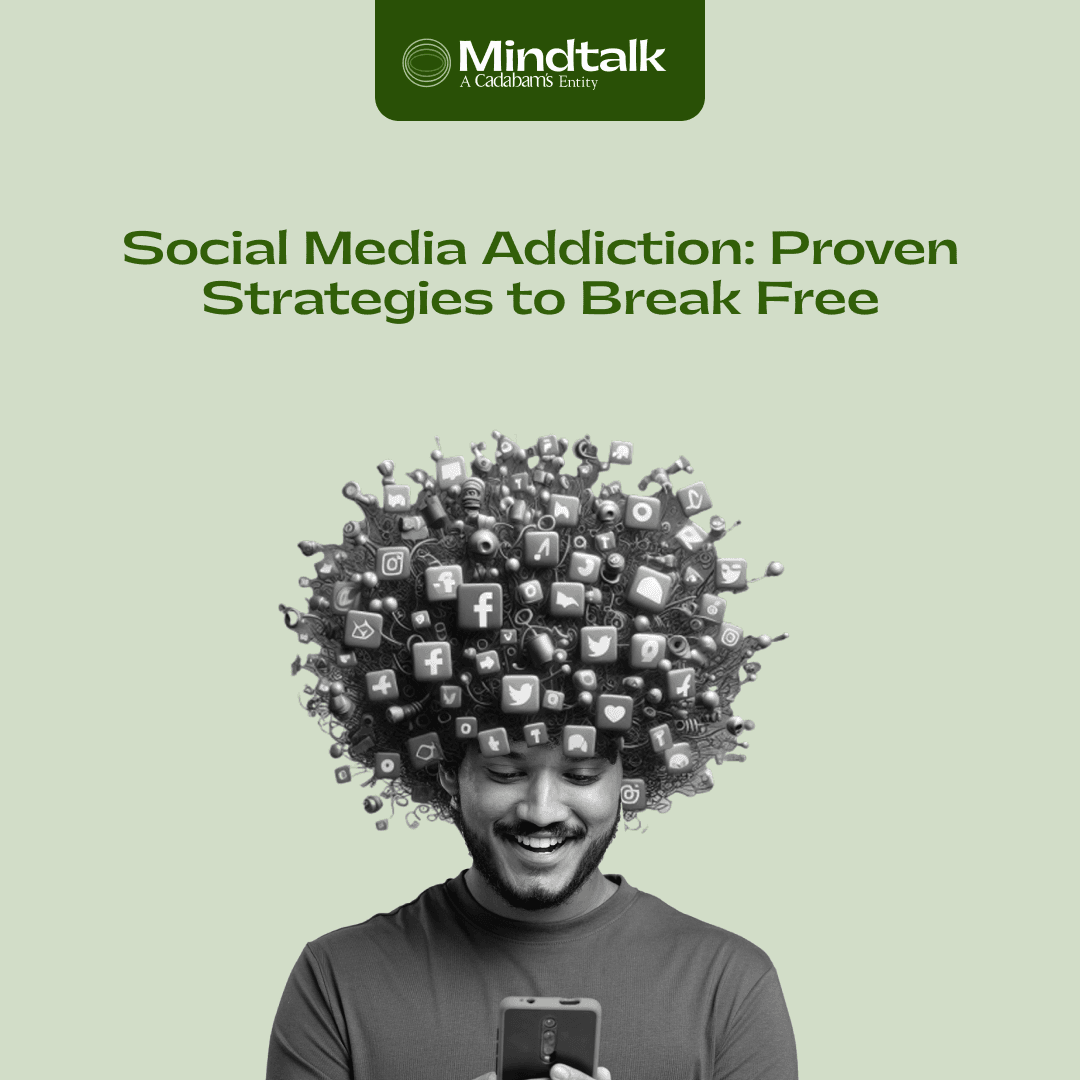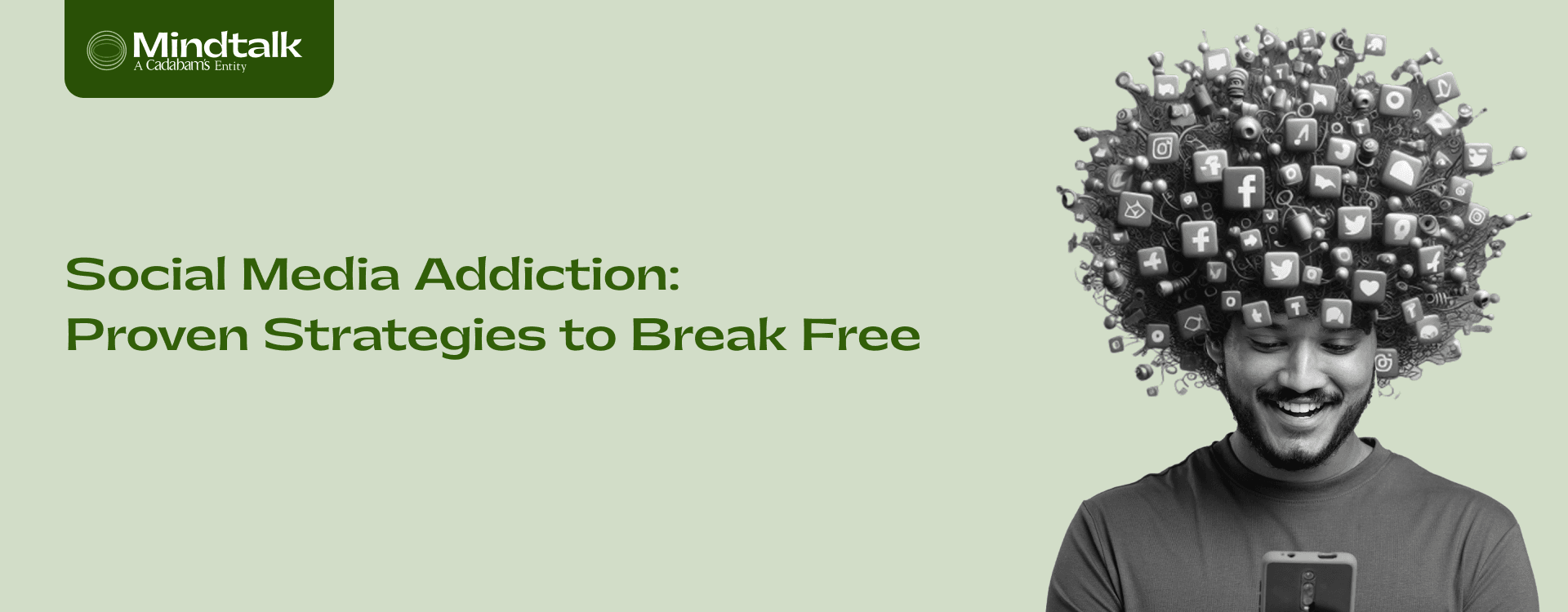Understanding Social Media Addiction And Its Causes

Social media addiction is a growing problem, especially among young people. We all know the ceaseless urge to keep swiping through social media for the next best reel. Well, if that raised an alarm in your head, it’s time we delve into social media addiction.
Recognizing The Signs Of Social Media Addiction
Social media addiction can manifest in various ways, often blending into daily life. This is why recognizing its signs is crucial for seeking appropriate support.
Identifying Overuse Patterns
Here are some patterns of overuse:
- Excessive time spent on social media: Regularly using social media for extended periods, even when it interferes with daily activities.
- Constant checking and notifications: Obsessively checking social media for updates, notifications, and new content.
- Social media as a primary source of information: Relying heavily on social media for news, entertainment, and social interactions.
Common Symptoms And Behaviors
Common symptoms and behaviors of social media addiction include:
- Anxiety and irritability when offline: Experiencing negative emotions when unable to access or use social media.
- Neglecting responsibilities: Prioritizing social media over work, school, relationships, or personal care.
- Using social media to escape reality: Seeking refuge from problems or emotional distress through excessive social media use.
Self-Assessment for Social Media Addiction
Reflect on your social media usage and consider the following questions:
1.Do I feel anxious or restless when I'm not using social media?
2.Do I use social media to avoid my responsibilities or problems?
3.Do I lie about how much time I spend on social media?
4.Do I need to use more and more social media to feel the same effects?
If you answered yes to several of these questions, it might be worth seeking professional help to assess your social media usage and develop healthy coping mechanisms.
The Impact Of Social Media Addiction On Health & Relationships
Social media addiction can have a profound impact on both mental and physical health, as well as personal and professional relationships.
How Can Social Media Affect Mental Health?
Excessive use of social media can lead to a variety of mental health issues. It can be anything from anxiety and depression to low self-esteem due to the unrealistic expectations and feelings of inadequacy that come with being on any social media platform these days. There can even be issues like late-night use of social media leading to a disruption in sleep patterns or just straight addiction.
Effects On Personal And Professional Relationships
Social media addiction can also strain personal and professional relationships:
- Neglected interactions: Excessive social media use can ignore face-to-face interactions and meaningful connections with loved ones.
- Miscommunication and conflict: Social media can distort communication, leading to misunderstandings, arguments, and disputes.
- Reduced quality time: Social media can replace quality time spent with loved ones, diminishing intimacy and emotional closeness.
Tips To Implement Digital Detox Periods!
Digital detox periods are crucial for disconnecting from the virtual world and reconnecting with the real one. Here are some tips for implementing adequate digital detox periods:
Planning Short-Term Social Media Breaks
- Set realistic goals: Start with short breaks, gradually increasing the duration as you become more comfortable.
- Schedule breaks in advance: Plan specific times when you'll step away from social media, such as during meals or before bedtime.
- Utilize built-in features: Most social media platforms offer tools to limit time spent or schedule downtime.
- Use apps to block social media: Consider using apps that temporarily block access during designated periods.
Engaging In Long-Term Detox Challenges
- Choose a suitable duration: Decide on a realistic timeframe for your long-term detox, considering your habits and commitments.
- Inform loved ones: Let your friends and family know about your detox plan to avoid misunderstandings.
- Find alternative activities: Replace social media time with engaging offline activities like reading, exercising, or pursuing hobbies.
- Seek support: If you find it challenging to detox alone, consider joining online or in-person support groups.
Remember, digital detox is a journey, not a race. Be patient with yourself, and gradually increase the duration and intensity of your detox periods as you progress.
Strategies To Overcome Social Media Addiction
We all know that going cold turkey is tricky, but that's why we do it in detox periods. Other than that, let’s look at what strategies we can use to overcome Social Media Addiction.
Finding Healthy Alternatives And Hobbies
When stepping away from social media, it's crucial to fill the void with enriching and fulfilling activities promoting well-being.
Exploring Offline Activities
- Rediscover the joy of reading: Immerse yourself in captivating stories, expand your knowledge, and enhance your imagination through books.
- Embrace the outdoors: Engage in activities like hiking, biking, swimming, or simply walking in nature to connect with the environment.
- Unleash your creativity: Explore art, music, dance, or writing to express yourself and cultivate your artistic talents.
- Engage in social interactions: Spend quality time with loved ones, join social clubs, or volunteer to foster meaningful connections.
Developing New Skills And Interests
Learn a new language: Expand your horizons and broaden your perspectives by learning a new language.
- Master a musical instrument: Embark on a musical journey by learning to play an instrument, fostering creativity and relaxation.
- Take up a sport or exercise routine: Improve your physical fitness and overall health by engaging in regular exercise or sports.
- Explore culinary arts: Delve into the world of cooking, baking, or mixology, experimenting with flavors and enhancing your culinary skills.
How To Set Realistic & Achievable Goals?
Setting realistic and achievable goals is crucial for success in any endeavor, including managing social media usage. Here are some effective strategies to guide you:
Defining Clear Usage Limits
- Identify your current usage: Track your social media usage patterns to understand your baseline.
- Set realistic targets: Aim for gradual reductions rather than drastic changes, considering your habits and lifestyle.
- Utilize built-in features: Leverage platform-specific tools to set time limits or schedule downtime for your social media usage.
- Incorporate mindful breaks: Take regular breaks from social media to focus on other activities and refresh your mind and body.
Gradual Reduction Strategies
- Start with small steps: Start by reducing your social media usage by 30 minutes or an hour daily.
- Increase the duration gradually: As you become more comfortable with the reduced usage, gradually increase the duration of your breaks.
- Identify and address triggers: Analyze the situations or emotions that lead to increased social media use and develop coping mechanisms.
- Seek support: Enlist the help of friends, family, or professionals to stay accountable and maintain your goals.
Consistent effort and self-compassion are crucial to achieving your social media usage goals. Celebrate your progress along the way, and don't be discouraged by occasional setbacks.
Seeking Support From Friends, Family, And Professionals
Social media addiction can be a challenging issue to tackle alone. Seeking support from friends, family, and professionals can provide invaluable assistance in your journey towards healthier social media habits.
Building A Support Network
Building a support network is a great way to tackle the issue; share your concerns with trusted friends and family members. You could even seek support groups online or in-person to connect with individuals facing similar challenges.
When To Consider Professional Help
It’s essential to consider professional help if the addiction is keeping you from maintaining your goals or even having a significant impact on your life. Addictions can turn sour and end up debilitating the person if not taken care of, so do make sure to consult a mental health professional.
The Role Of Therapy And Counseling
Therapy and counseling play a vital role in the process of addiction. Through treatment modalities like Cognitive Behavioural Therapy (CBT), mindfulness-based therapies, and addiction treatment programs, a mental health expert can help guide you on your journey toward de-addiction.
How Mindtalk Helps You To Embrace A Balanced Digital Life
If you’re struggling to keep a balanced digital life and need support, look no further than Mindtalk. Our team of well-trained mental health experts will be sure to guide you through the steps you need to take to lead a better and balanced life!
Suggested Topics
